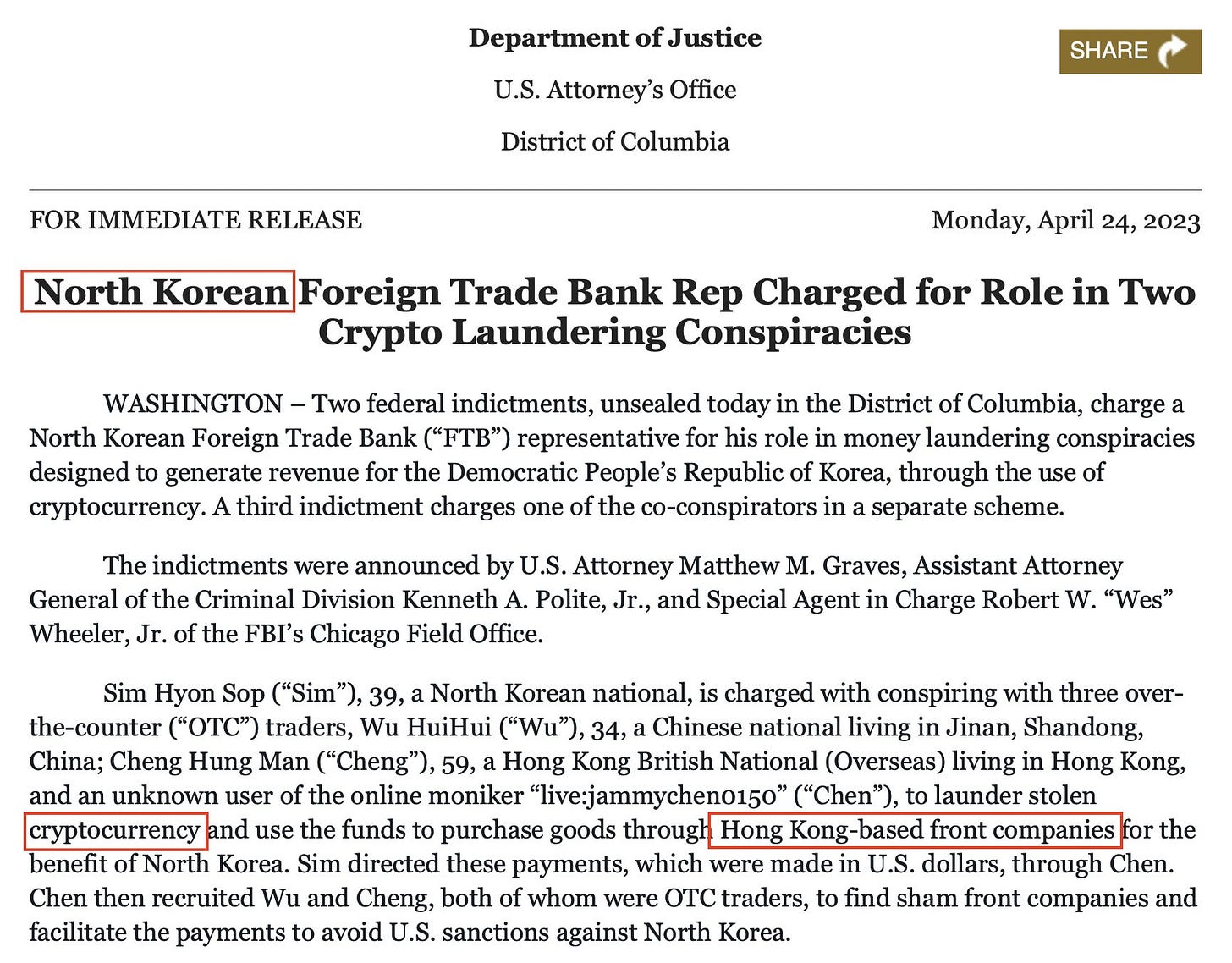The Axos Of Evil
Axos Financial at the end of the cryptoverse.

Apologies for the long gap between missives. Apparently I have quite a few more readers than I ever thought I would have which has resulted in a need for higher standards when pushing “publish” which has resulted in a long list of 50-80% finished essays and articles that haven’t managed to get over the finish line.
I am of course always active on The Privatized Public Square.
Crypto bros and broettes the world over would have you believe that any day now cryptocurrency will replace our current international monetary system. It remains an uncomfortable fact, however, that as of 2023, a full 15 years after Mahatma Satoshi minted The First Coin, you still can’t actually buy much of anything with cryptocurrency1. Sure, for a minute there you could buy a couple of things. Peruvian sweaters and questionably marketed electric vehicles featuring even more questionable “full self driving” features spring to mind. But those fads came and went faster than the Pet Rock. Much to the chagrin of bros everywhere2 the sad state of affairs is that no matter how much wealth your cryptocurrency “investments” have brought you “on chain”, out here in “the real world” you still need to turn your crypto back into pounds, euros, dollars, yen, renmimbi, rials, or any of the other inflationary state sponsored enterprises that crypto was supposed to conquer if you want to buy things like food, shelter, and lambos3. And that, in turn, means that you have to interact with the global banking system.
Unfortunately for you, dear lambo buyer, many of the players - in fact basically all of the players4 - in the global financial system regard cryptocurrency with suspicion. Deep suspicion. So much so that it fell upon only a handful of banks to handle the vast majority of the actual monetary value that has flowed into and out of the cryptoverse5. The bros and broettes call these “fiat rails” but perhaps a better term is “fiat support beams” because if these banks fall over then one bitcoin will only ever equal… one bitcoin. And as much as “1 BTC = 1 BTC” has become the rallying cry of bros worldwide it’s still unfortunately the case that grocery stores don’t accept any amount of BTC up to and including 1. So you gotta deal with the banks. And unfortunately for you those banks are encumbered with all these… regulations. Ugh. What a bore amirite?
Your average crypto bro has spent approximately 0 minutes6 contemplating the fact that every single financial regulation on the books exists because someone, somewhere, maybe a long time ago but more likely relatively recently, found a way to game the system and steal everyone’s money7. But here’s the reality: financial regulations are the walls the rest of humanity has built around the infernal armies of Mammon in an increasingly desperate attempt to keep the horde from devouring us.
Since the dawn of time this archdemon and his minions have by hook, crook, or bullshit mathematical formula repeatedly managed to break their chains and turn the assets of hardworking people with jobs making things humanity actually needs into lambos, bottles of Cristal, cocaine, and even the occasional award winning movie. And when the monster has run its course, drained its last champagne flute, and abandoned its last supercar in the sands of the Arabian peninsula, it rolls up to the rest of society like the prodigal son, begging for forgiveness and just a little more “liquidity”. This has happened more or less like clockwork every generation or so since we invented the financier class.
Robin Williams explains it pretty well:
“The only useful thing banks have invented in 20 years is the ATM.”
- Paul Volcker (Chairman of The Federal Reserve)Anyways back to the banks. As I mentioned most banks do not like to deal with cryptocurrency. Like, at all. For some reason they (the banks) tend to suspect that cryptocurrency companies might be doing things like laundering money for the Russian mafia, violating Iranian trade sanctions, or helping North Korea build nuclear weapons. The reasons they suspect this are still shrouded in mystery but scientists are starting to think it might have something to do with these pieces of paper that keep turning up from something called “The Department of Justice".
Like snowflakes these pieces of paper appear to each be unique and beautiful.
Given that people who hold banking licenses are all too aware that if they even accidentally launder money for North Korea they will almost certainly be stripped of their banking license, quite possibly end up imprisoned, and, if they are truly unlucky, be blown up along with their family by a missile launched from a drone in a neighboring country’s airspace, you can see why they might be a little hesitant to get involved with cryptocurrency. But fear not! For there are some intrepid bankers willing to take those risks.
Here’s a list of some of the biggest banks willing to take the plunge:
Silicon Valley Bank (SIVB, once ~$200 billion, now $0 billion)
Signature Bank (SBNY, once ~$100 billion, now $0 billion)
Silvergate Bank (SI, once ~$16 billion, now $0.01 billion)
Axos Financial (AX, ~$20 billion, still $20 billion)
Customers Bancorp (CUBI, ~$16 billion, still $16 billion)
Metropolitan Commercial Bank (MCB, ~$6 billion)
Cross River Bank8 (not publicly traded, ~$5 billion)
If you noticed a pattern starting to develop here9, congratulations. Because it’s not a coincidence that the world was transfixed earlier this year by the sudden collapse of Silvergate Bank (which a lot of people predicted for a very long time), Signature Bank (which I predicted in December), and Silicon Valley Bank (which I did not predict but I attempted to explain in the last episode of The Cryptocalypse Chronicles).
But there’s another pattern here, one that you have to do some digging to find. Most of these banks happen to offer their customers a “not yet bank permissible10” 24/7 payment network based on “the blockchain”. In fact most if not all of these banks offer their customers the same “not yet bank permissible” 24/7 payment network. It’s called TassatPay and boy is it good at being a medium of exchange.
I will point out that $1 trillion in payments is roughly 4% of the GDP of the richest country in the history of the world, all moved about on the payment networks of some very small11, very questionable banks. And what are their customers paying for with all these transfers?
Why, “international shipping”, of course12.
Signature Bank (R.I.P.) had SigNET. Silvergate (R.I.P.) had SEN. Customers Bank’s team offers the mellifluously named “Customers Bank Instant Token”. And Axos Financial (still) has AxPay.
Axos Financial managed to fly under the radar of The Twitter Bank Mafia even as the three largest banks on the list were felled by the slings and arrows of outrageous facts posted on the internet. But that all ended a few months ago when Axos Financial was named in lawsuits filed by the CFTC and the SEC against Binance, the world’s largest cryptocurrency exchange, and its creatively named American arm, “Binance US”. Having fired their warning cruise missiles across Binance’s bow the SEC and CFTC were concerned that Binance might try to beam American customers’ money from Binance US up into the less extraditable13 mothership. And so it was that the fact that Binance US maintains multiple accounts at Axos Financial, which had up until that point been a closely guarded secret, was entered into the public record.

This disclosure delighted The Twitter Bank Mafia, whose membership had been left slightly bereft when all the banks that they thought would collapse actually did collapse one after the other in rapid succession14. Not only was there a new bank to investigate but lo and behold this bank had a reasonably large deposit base. It was even publicly traded on the New York Stock Exchange!

For starters it seems like Axos Financial would prefer not to disclose to its investors the fact that it is providing banking services to an offshore financial institution whose chief compliance officer texts15 things like “come on, [these terrorists] are here for crime” to subordinates right before he texts those subordinates instructions on how to guide those customers through the process of evading laws about money laundering and terrorist financing so that they could at least have enough money to buy an AK-4716. Then there’s the fact that after an extremely long run as an executive of Axos Financial the CEO - totally coincidentally, I’m sure - decided that the time period after the facts came out about exactly which terrorists might be accessing the American banking system through his institution17 but before the rest of the market really sat up and took notice would be an ideal time to start selling his stake in the company off in large chunks. Which is of course what every CEO of a financial institution in these kind of ideal market conditions would do.

It’s important to bear in mind that the “risks” section of the document your company files with the SEC must contain every single possible risk to your business both in this world and the next. Hurricanes, tsunamis, supervolcanoes, rogue CEOs, bank robbers, the appearance of the archangel Gabriel bearing a flaming sword in the foyer of your office building, Jerome Powell growing a pair of balls - all these things and more are described in great detail in the risks section of your average 10-K almost to the point of absurdity. There’s a very good reason for this. Two reasons actually.
First of all if anything bad happens to your company’s share price because of something you didn’t put in that list you can (and absolutely 100% guaranteed will) get sued both personally and professionally for any losses taken by shareholders. There are law firms that literally do nothing all day but trawl owners of recently crashed stocks looking for an excuse 1/10th as good as a legitimate failure to disclose a risk that cratered the company. And let me just assert that providing banking services to companies whose sole purpose seems to be facilitating international money laundering for drug cartels, terrorists, and oligarchs on a nation state scale would be considered “risky” by most definitions of the word.
Axos Financial’s 10-K makes it clear they understand the risk of reputational damage from “negative publicity” even if they decline to cite what, exactly, might cause the damage.

Second of all the government can put you in prison for failing to disclose risks. Even if the share price doesn’t go down. Even if the share price goes up. Just ask Martin Shkreli AKA “pharma bro”. He didn’t go to prison for anything having to do with pharmaceuticals. He went to prison for several years for failing to disclose risks to his investors on an investment that made money.
Then there’s this:

Oh, and this:
While I have been unable to verify this claim about Mr. McCombs due to the confidentiality of state bar proceedings I tend to suspect it is probably true. After all, as a wise man once said:
Except more cryptocurrency. Oh, and drugs. You can definitely still buy drugs with crypto, though for the most part only by the metric tonne.
Actually crypto bros don’t regard this as a sad state of affairs. Quite the contrary - despite the fact that literally every large brand that tried accepting bitcoin in exchange for its products has reversed course they still see widespread adoption coming any day now. It’s of a piece that their belief that every calamitous crypto disaster that bankrupts thousands of people and ruins innumerable lives is “good for bitcoin”.
Lambos are Lamborghinis, if you’re new here.
There are exceptions. North Korea loves crypto. Russia also seems to have changed its mind.
So far mostly into. Because nothing is actually produced by cryptocurrency, the moment an equal amount of money has flowed into and out of the cryptoverse crypto will be worth absolutely nothing, so the fact that it’s still not worth nothing means that the balance of payments is on the “in” side. There’s a technical term for this kind of arrangement.
The broettes are more introspective, averaging roughly 0.5 minutes.
This lack of introspection is probably related to the fact that someone manages to steal millions - or even billions! - of dollars worth of those bros’ money almost every single day.
More on this gem of a bank soon, but let’s just say it takes a special kind of bank to be both named and shamed by Congress for facilitating massive amounts of covid relief loan fraud at the same time as the FDIC more or less shuts you down for discriminatory lending. Cross River Bank is that bank.
Other than the fact that the three biggest of these banks start with the letters S and I. That’s is an epiphenomenon scientists are still working on explaining.
This is how Signature Bank (R.I.P.) described its SigNET network.
At least now that Signature Bank is gone.
Any inferences about what exactly these customers might be shipping are left to the reader; I can only offer the observation of certain coincidences.
In fact possibly even non corporeal, given that Binance doesn’t have like, an address. At least not one on earth.
Contrary to popular analyst opinion which held out most of these as great investments to their paying subscribers to the very bitter end. R.I.P., retail investors’ life savings.
These are not the world’s smartest criminals and this was not their only self incriminating text message.











Superb. Smart, critical, fearless, and witty. What's not to like.
Always a pleasure to read your work. Thank you!